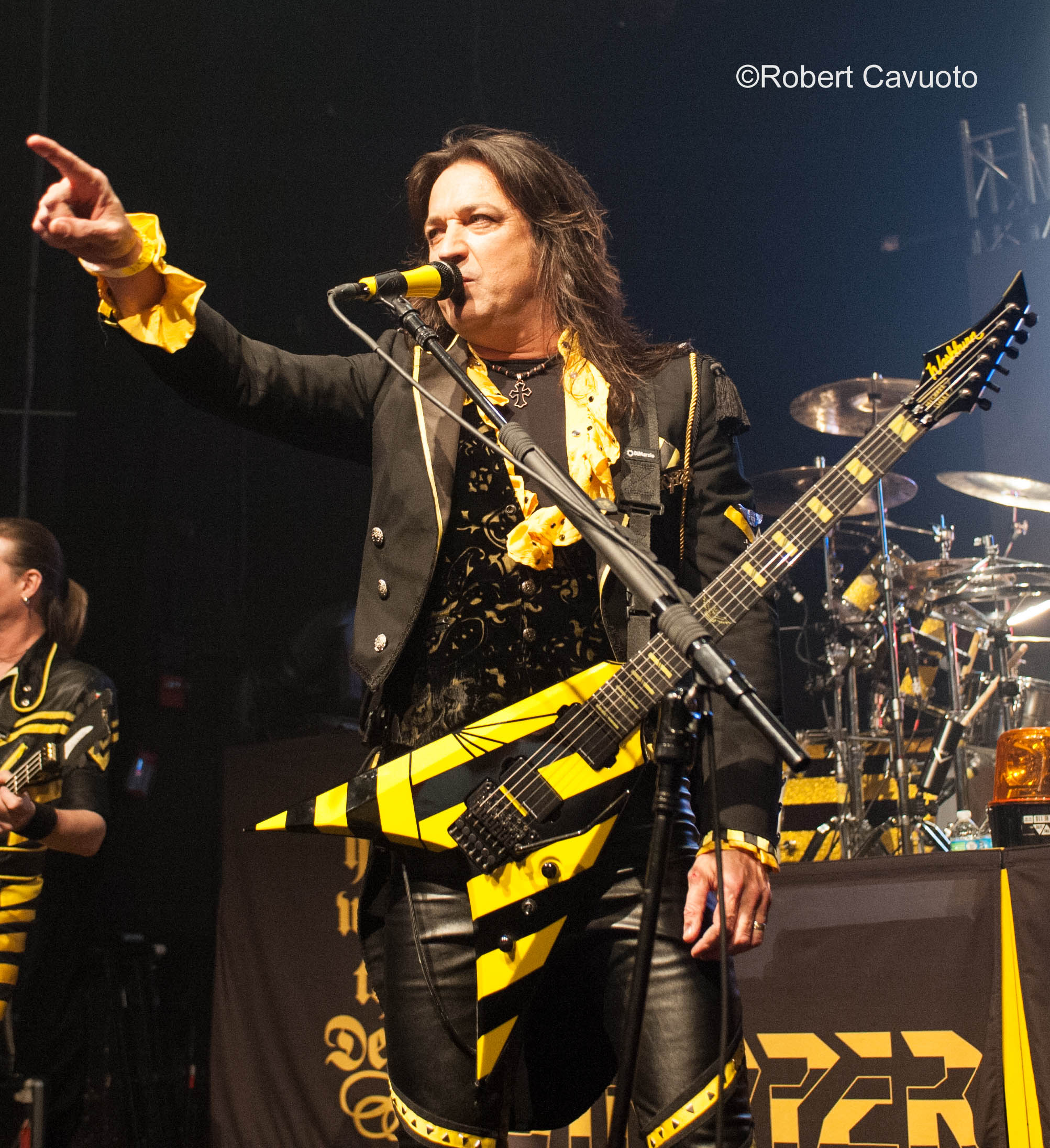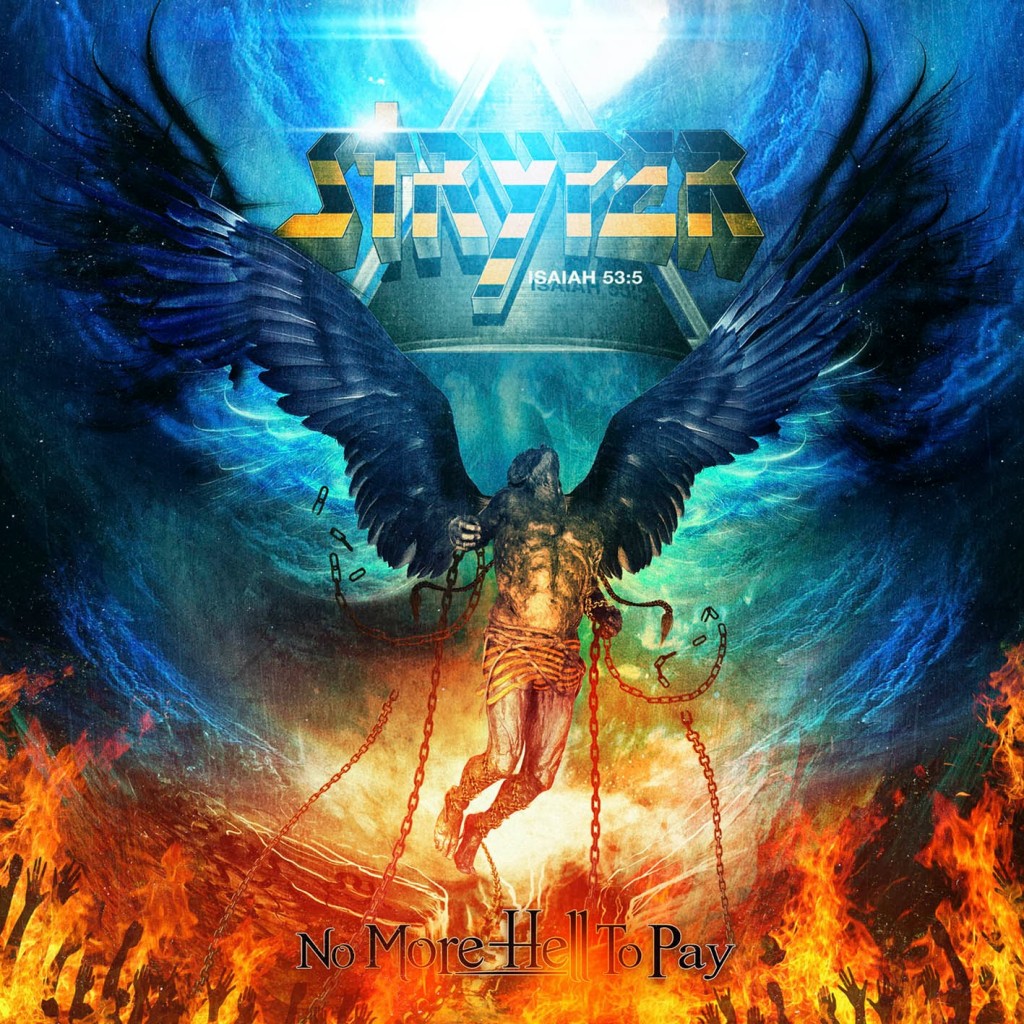By: Robert Cavuoto
Stryper have shown that they are still a force to be reckoned with in the hard rock/heavy metal world with their 8th and heaviest release to date, No More Hell To Pay.
This CD is packed with some of Stryper’s strongest songs, reminiscent of their 1986 release, To Hell With the Devil, without sounding dated or contrived. The album could have surely been its predecessor without missing a beat. The songs are darker, grittier, and heavier than most people would expect. They strike a perfect balance of merging new licks with searing guitar solos and steel belted screams.
If you lost your way with Stryper, songs like “Saved by Love”, “Sympathy” and “Renewed” will certainly renew your faith as they are all fast paced and catchy with aggressive guitar licks.
To prove it, the band stormed the charts landing at #3 on the Current Hard Music Album and Top Hard Music Album charts, #6 on the Top Current Rock Album charts, #33 on the Billboard Top 200 Current Albums and #35 on the Billboard Top 200, selling over 9500 copies the first week.
The yellow and black attack consist of all original members; Michael Sweet [vocals/guitars], Oz Fox [guitars], Tim Gaines [bass] and Robert Sweet [drums].
I had the pleasure of chatting with Michael about the new CD, as well as discussing the band’s frantic beginnings playing on Sunset Strip in West Hollywood.
******
 Robert Cavuoto: I think you really hit the mark with No More Hell to Pay. It truly captures Stryper’s signature sound.
Robert Cavuoto: I think you really hit the mark with No More Hell to Pay. It truly captures Stryper’s signature sound.
Michael Sweet: We try to with every record, but sometimes it’s just a mess no matter how hard we work on it. This time around, I think everything came together and we were able to put out one of our best albums.
We’ve ventured down a different path at times in a not so positive way, like with Reborn. That was originally supposed to be a solo record. The only thing we did after we decided to make it a Stryper album was we rerecorded the drums and a few guitars. I think that record was a little too modern and we got away from our signature guitar solos and harmonies. We got away from the high screams. This record was more about focusing 100% on everything Stryper fans have always wanted to hear. We’re still trying to be relevant today without selling ourselves short.
Robert: You also manage to strike a perfect balance of great riffs, great hooks and spiritual message. Is that difficult to do on every song?
Michael Sweet: It can be and I don’t mean it to come across in a prideful way, but, I’m very confident in what I do. I’m very confident in myself as a producer, as a writer, as a vocalist, and guitar player. I think I go into a project just with a really high level of confidence.
I don’t accept, “Oh my gosh, is this gonna be tough?” Or “Oh my gosh, what am I gonna do?” I just do it. And it just kind of happens, miraculously.
Robert: I think that comes across in songs like “Sticks & Stones” and “Water Into Wine”. Both songs titles are interesting phrases yet have profound messages.
Michael Sweet: I know. “Sticks & Stones” is just one of those things where you just say it, the old nursery rhyme, comes to mind and you think this could be real corny and fall flat. But, it works. And yet, we also make sure that we always get the point across, which is – from day one – has always been for Stryper to point people in the direction of God’s love. That’s why we do this.
Robert: Can you give me some insight into my two favorite tracks on the CD; “Saved by Love” and “Renewed?”
Michael Sweet: I grew up on all different types of bands and music. I had so many inspirations, in terms of different styles of music. I used to listen to bands like Loverboy, Motorhead, Van Halen, Deep Purple, and Creedence Clearwater – all from one extreme to the other.
I think “Saved by Love” was all about getting back to the riff. I wanted to make certain that the guitar riff was the root of that song and the foundation. It’s got that real high energy, up-tempo feel to it. Again, it’s one of those songs that people expect from us but don’t always get. And they got it this time around.
Same thing with “Renewed”. Very similar to “Saved by Love” in terms of its up-tempo, fast pace, and all about the riff. It’s the riff that draws you in and hooks you, and it’s got to be strong. To your earlier question, if there is a hard part to it, it’s coming up with riffs that don’t sound like any other riff. [Laughter].
I mean, there are hundreds of thousands of songs over the years and it’s like how do you come up with something fresh and new? Well, you just hope and pray for the best.
Robert: I thought the artwork on the CD was pretty cool. How does it connect with the title track?
Michael Sweet: Well, my thoughts going into this record, that it had to rival or surpass To Hell With the Devil. That’s our biggest album. I wanted to try not to be a carbon copy of, but to be as good and have the similarities where people look at it and go, “Oh, this reminds me of To Hell With the Devil.”
Everyone is saying, “Wow, man, this is the record that should have followed To Hell With the Devil. So, we really think we hit it out of the park on this one.
Robert: On this CD, you cover “Jesus is Just Alright.” Was that a leftover track from your Covering CD?
Michael Sweet: It wasn’t. It’s odd but it wasn’t even on the list. We had a big, long list of potential songs for Covering, and that one was not on the list. But it was, however, a song that we’ve discussed multiple times over the years about possibly recording. We figured we always liked the riffs and keep the Doobies’ version. And we thought, of course, lyrically and message-wise, it’s perfect – tailor-made for us.
I’ve read some comments of people saying that its one of their favorites, and I’ve read some comments of people saying we could have probably left that one off because we ran out of material. And it’s really not that at all. We just thought it would fit perfectly with everything else around it.
Robert: I though the CD sounded great sonically. What did you and Oz Fox, use to track the CD?
Michael Sweet: I used a GMW guitar and a Carvin guitar both loaded with Bare Knuckle pickups. Then I used a Splawn Quick Rod amp and a Mesa Boogie Mark V. Oz used the same except he used different guitars. We have some guitars with some Seymour Duncan pickups. We’re big Seymour guys, and lately I’ve also been a Bare Knuckle guy. I like combining the two.
We always pre-amp, that’s that signature Stryper sound. Whatever amp we’re running, with a parametric EQ. That’s how we get that sound. We usually drive a good 15 to 20 Db at between 750 and 1K on the front end.
Robert: A lot of musician’s I speak with lately are using Bare Knuckle pick-up, what is it about them?
Michael Sweet: They’re really cool. They’re hot pickups; you gotta control them, but when you put them up against a lot of other pickups, it’s like plugging into a different amp. It’s literally night and day.
Robert: You’ve had a couple of gigs since the CD came out. What new songs are you playing live?
 Michael Sweet: We just did a gig where we recorded a DVD/CD at the Whiskey in L.A.. We did four new songs; “No More Hell to Pay,” “Jesus is Just All Right,” “Marching in the Battle,” and “Legacy.” Then we threw in some old ones that we haven’t played in a long time like, “Always There for You,” “You Know What to Do,” and a different rendition of “Honestly,” which was really fun.
Michael Sweet: We just did a gig where we recorded a DVD/CD at the Whiskey in L.A.. We did four new songs; “No More Hell to Pay,” “Jesus is Just All Right,” “Marching in the Battle,” and “Legacy.” Then we threw in some old ones that we haven’t played in a long time like, “Always There for You,” “You Know What to Do,” and a different rendition of “Honestly,” which was really fun.
It has a Latin feel to it. I was just playing acoustic. I was playing a neck pickup almost like a Santana vibe, for some soloing. It was just nice to do it in a different way, because we’ve done it the same way for so long.
Robert: What was it like to play the Whiskey after all these years?
Michael Sweet: It’s amazing. Oz and I did an acoustic set there not long ago but it was incredible as a whole band. I think the last time we were there as a band was in 1991. The first time I played the Whiskey, I was 16-years-old. So really crazy to be back there in the dressing room, just looking at the walls, saying “Oh, my gosh. If these walls could talk.” There’s been so much that’s gone on there.
Robert: I can only imagine you get a lot of people come up to you and say how your songs or albums have been inspirational. What’s it like when somebody says your songs have changed their life or their path in life?
Michael Sweet: It’s incredible. At the end of the day or the end of our lives , the music, the rock and roll, getting up there and having fun and all that stuff is amazing. But, to have an effect on somebody’s life in a positive way and to pull them out of drug addiction or wanting to commit suicide and to look back and to say, “My gosh, we took this person who was suicidal, and now he’s pastoring a 10,000 member church. It’s amazing. So we’re blessed.
Robert: When you first dedicating the band to God, was there ever a concern that people weren’t going to follow you, or were you counting on blind faith for it to work?
Michael Sweet: A lot of people throw the terminology around that we did this as a gimmick to make money. And I laugh at that, because it’s the most ridiculous thing I ever heard. If we wanted to make more money, we wouldn’t have done this. And that’s just the truth about it. I think we would have made more money, been a lot bigger, and been a lot more popular.
I’ll even go a step further and I’ll say I know we would have been. Some people will roll their eyes at that and probably disagree which is fine, but I do. The reason why I say that is we were on the scene before we were Stryper on Sunset with Ratt and Motley. And we were taking off just as they were. So we still would have made it; it just would have been in a different way, and we chose to get off the path that was leading us to the debauchery, sex, drugs, and rock and roll. We didn’t want that any more. We devoted it to God, and yeah, we were in our deepest thoughts, not necessarily concerned but certainly thinking, “Okay is this going to fly? But if it doesn’t, oh, well; we’re still doing what we want to do.”
Robert: Musically, you are on the same level as Ratt, Poison, and Motley Crue.
Michael Sweet: Well, we get the people who are commenting all the time on Blabbermouths. “These guys suck; they always have.”
You know what’s really funny is if they could go back in time and see we were a house band with Ratt, and we would pull as many people, if not more than Ratt. We were coming up hard. We would play the Troubadour, and they’d turn away a thousand people. They’d pack the place in – we did two sets at the Troubadour once, and they turned away a ton of people. It’s like we were on the verge of really busting open. And then we decided to go down a different path. We still wound up doing something and Lord willing, but my point is that I think we didn’t do this as a gimmick, to become big rock stars. That’s just silly.
 Robert: When you switched over, was it difficult gaining acceptance from club owners and other bands to open for when you had this spiritual message?
Robert: When you switched over, was it difficult gaining acceptance from club owners and other bands to open for when you had this spiritual message?
Michael Sweet: Back in the early days we didn’t because we weren’t Stryper. We were called Roxx Regime, and we weren’t singing about God. We were singing songs like “Loud and Clear,” and “Marching Into Battle,” but they had different lyrics. In “Loud and Clear” there was a lyric in the song about drinking beer. They were different lyrics. So we never got any concerns from club owners at that time.
Once we became Stryper, and really started taking off, I thing it became, to some degree, just about the money. I mean, if they could pack people into their club, they didn’t care what we were singing about. [Laughter] I think that’s the truth of the matter.
Robert: Was there ever a point where you said, “This is not working. We need to change the direction of the band to take advantage of potential success?”
Michael Sweet: There was that period around the early 90’s. I left in ’92, and what happened was we just got to a point that we got so beat up. We let our guard down. We got weak; we got beat up by the church for years. People were coming against us not just from the church, but from the world. They were saying, “They suck; they’re a joke,” from all ends and we caved in. Against the Law was a big FU to the world.
Robert: Why was the church against you?
Michael Sweet: They thought we were wolves in sheep’s clothing, phonies. That we couldn’t be Christian because we look like we looked and we sounded like we sounded. After years of that, it broke our hearts and we rebelled. And like I said, no disrespect, but it really was kind of like a FU to everybody.
Screw you guys. We’re going to do what we want to do now. And we did, and after doing so, we’d go up onstage and tell people, “Man, you don’t need alcohol,” and we’d go to the bar and get drunk with them. [Laughter]. I felt like such an extreme hypocrite, and I was and we were. I just didn’t want it anymore. I had to get out of the band. I had to start fresh and wipe the slate clean.
Robert: Do you think your core fan base follows you because of the spiritual message or for the music?
Michael Sweet: I would say both. I talk to countless people who listen to us only for the music, people who are atheists and Satanists. We meet all the time. I talk to them on Facebook and the forums and, “I’m an atheist; I love you guys. You’re my favorite band.”
Then we were on a show once for VH1 where they would play videos with similar content. This particular episode was about videos with religious content. They played one of our videos, a Madonna video and a Marilyn Manson video for a group of religious leaders and then a group of Satanists. The religious leaders had no idea who we were, and the Satanists all knew who we were. The head Satanist out of New York City, in this group said Soldiers Under Command was one of his top five albums of all time.
Robert: You produced this album as well as most of the Stryper CDs, at what point did you really start to understand the term producer?
Michael Sweet: I’ve lived in studios since I was a young kid. I played rhythm guitar when I was 12-years-old on my Dad’s country sessions. I co-produced every Stryper album and produced every Stryper album since ’03.
I don’t really think people see me as a producer, because I’m in the band. I think that’s just the way it goes, but I am the producer of the band. I feel that no one really knows how to achieve the sound like we achieved on No More Hell to Pay better than I do. Hopefully, I’ve proven that with this record.
We could have gone out and spent $100,000 and hired a producer and give them four points and be in debt and not see any money or have me produce it for $25,000. I don’t understand the logic, especially when we deliver the goods and it sounds as good as, or better than, what we would get with a hired producer.
We have a system. We have a great engineer, Danny Bernini, and I think that’s key. We record at a place called Spirithouse in Northhampton. We go and we live there and we eat there and we record there for two weeks. We do all the basics. Then we come to my house and do the vocals, and we go back to Spirithouse to mix it. And it works.
 Robert: When you made it big, what was the first thing you went out and bought yourself?
Robert: When you made it big, what was the first thing you went out and bought yourself?
Michael Sweet: First thing I bought with cash was a black Corvette with T-tops. I had a gigantic wad of cash with rubber bands around it, [Laughter] and I went in to buy an ’86 Corvette.
The dealer was treating me like a scumbag. I test drove it and he still treated me like a scumbag. Then when I pulled out the cash, Oz was with me, we got treated like royalty. I almost wanted to walk out and go buy it from someone else. If I could go back in time, I would not have done that, I should have invested the money. I didn’t invest enough. I would have been a little bit smarter.
I had it for about a year, and when my wife, at the time, Kyle, was pregnant, we got a small fender bender and it scared the heck out of me and I drove straight to Robert’s house and said, “I’ll sell it right now to you for $20 thousand [Laughter] I think I paid like $34,000 for it. I sold it to him and got a Sterling, a little safer car.
Robert: What’s the one thing that Stryper fans will be shocked to learn about you?
Michael Sweet: I don’t know. I’ve been pretty open about everything lately. I’m a pretty normal guy; I’m a pretty boring guy. I’m very OCD and ADHD, very ritualistic in the sense that I do the same thing every day. I walk the dog and use the Swifter on my wood floors, due to my OCD, and straighten pictures all day and all that kind of stuff. I’m pretty anal about everything
Robert: You seem amazing with social media particularly with Twitter. How important is that to you nowadays
Michael Sweet: It’s amazing and that’s the beauty of it. It’s instant and you can communicate with all your friends and fans in an instant.
What’s really cool about it is, of course, it’s great to have as a tool to promote and get the word out about the band, and have personal one-on-one with people. This is awesome. When someone says, “Hey, my husband is sick and in the hospital; can you pray for him?” I retweet it. That goes out to all the people and all of a sudden I’ll get 20 or 30 tweets of people saying, “We’re praying for him. Yeah, done, done, and done.”
That’s just the coolest thing. It’s a fine balance between too much and not enough. I find I’m doing it a little too much and neglecting my family sometimes.